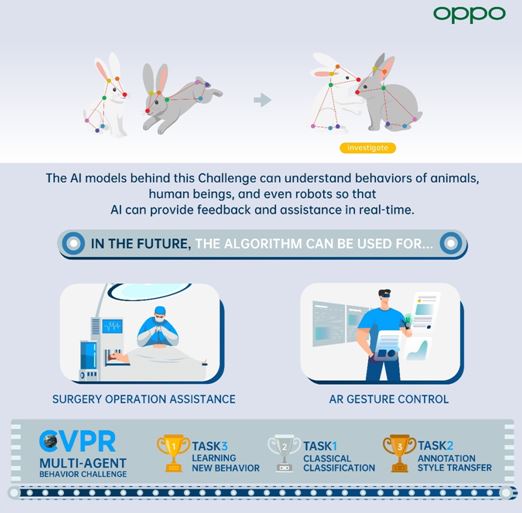SHENZHEN: Leading global smartphone brand OPPO recently took part in the premier annual computer vision event Computer Vision and Pattern Recognition Conference (CVPR) 2021.
During the conference, OPPO’s achievements in AI were recognized with its placing in seven major Challenges in 12 different contests in total.
These included one first-place, seven second-place, and four third-place awards, demonstrating the company’s industry-leading technological strengths and innovative breakthroughs in AI.
The team participating in the CVPR 2021 competition on behalf of OPPO came from the Intelligent Perception and Interaction Department and OPPO US Re-search Center of OPPO Research Institute.
Through the optimization and training of AI algorithms, the teams’ work continues to strengthen OPPO’s AI capabilities and the ability of its AI technology to better serve people.
Eric Guo, Chief Scientist, Intelligent Perception, OPPO, said,”We are very pleased to have achieved such remarkable results again in this year’s CVPR Challenges, following our inaugural participation in CVPR 2020.
Last year, we won first place in Perceptual Extreme Super-Resolution Challenge by demonstrating technology that can sharpen the appearance of blurry images and in Visual Localization for Handheld Devices Challenge that makes fusion positioning more precise.
The Challenges won by OPPO this year, such as Mul-ti-Agent Behavior, AVA-Kinetics, and 3D Face Reconstruction from Multiple 2D Images, cover more complex and advanced areas of computer vision, including behavior detection, localization of human actions in space and time, and facial detection. ”
“These technologies can be used in a whole range of scenarios such as manufacturing, home, office, photography, health, and mobility,” added Guo. “At OPPO, we are committed to making AI better serve people, providing users with more intelligent and convenient experiences.”
Multi-Agent Behavior Challenge
Among its eleven honors, OPPO received three awards in the Multi-Agent Behavior Challenge, which assesses an AI model’s ability to understand, define, and predict complex interactions between intelligent agents such as animals and human beings. OPPO ultimately won the first-place prize in the Learning New Behavior category, second-place in Classical Classification, and third-place in Annotation Style Transfer, distinguishing itself from over 240 other participants thanks to its leading AI capabilities.
This same technology is currently playing an essential role in OPPO’sfactory, where the algorithms assist workers in reducing operational mistakes, particularly in key production steps, to ensure their own safety as well as the quality of products coming off the production line.
OPPO US Research Center participated in the Dense Depth for Autonomous Driving Challenge, demonstrating its technology that can output dense 3D depth information based on a 2D image. OPPO won second place in the Self-supervised track and took home “Novelty Award.”
This technology uses deep learning models to directly output depth information from regular images, and it may replace depth sensors such as ToF in the future to bring better indoor and outdoor navigation experiences.









Comment